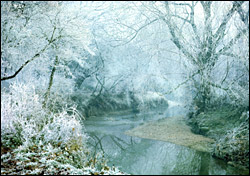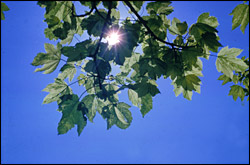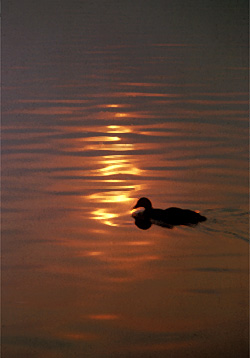|
|
|||||||
| HUMANITY AND NATURE
People in history have in many ways had an ambivalent attitude to nature, and perhaps only in the affluent western cultures is there the security for the real luxury of the beauty of nature to be fully enjoyed. Nature has always included a threat of disaster, from which only the developed part of the world has some immunity. Nature and the countryside have not always been as well regarded as they are now in the "Atlantic" cultures. We see beauty in nature and landscape, but it has not always been so, and appreciation of the countryside is quite a recent faculty: for most of history the countryside between towns has been at least inconvenient and at worst very dangerous. Law, technology, and communication have made the countryside safer than it was, but that does not apply everywhere in the world. Given some security, it took the Romantic movement to show us the beauty of the landscape. They taught us to see beyond the beauty of flowers and gardens, and to appreciate the wild landscape of mountains, cliffs, waterfalls, and the sea. NATURE "Nature" can mean the living Biosphere of the Earth, the living Nature of which we are a part, but it can also mean all of the natural universe, from particles to a galaxies. a ladder of scale in which we are clearly near the lower end. However there is another ladder, the ladder of complexity, and there we stand rather higher, for it is said that the human brain is the most complex entity that we know. It also seems likely that no greater complexity can have developed elsewhere, as the amount of time since the beginning seems to preclude the opportunity arising anywhere else. We seem to represent the built-in tendency of the universe to create consciousness, and we represent the consciousness of the universe, the consciousness of nature. While we seem now to be acting contrary to nature, never until now have we known what we are doing - deserts were created in the past in blissful ignorance - and it is probable this will become common knowledge, and change instigated. However, change will probably be too late to avoid the development of a new balance in nature, one possibly less convenient to humanity. There is now no excuse of ignorance available, although it is true that some countries continue to ignore the evidence. BEAUTY AND NATURE We are equipped with mental functions that have been formed through evolution to aid our lives, mental archetypes that guide our actions. A love for our locality is one, and as our knowledge has expanded, our locality has expanded to become the whole world. Another function lies in the sense of beauty that is so often aroused by nature and the world around us. The evocation of this sense of beauty is its own reward, a satisfaction, or perhaps a happiness, that escapes description and is unlike the rewards of any other benefit we receive. Almost all of us feel the beauty of nature, first perhaps simply in a single flower, or a whole bank of flowers, but a moment's examination will show us beauty in almost any leaf, in the fine fractal patterns of its circulation system and its serrated edge. When we rise to the enormous complexity of a single tree, the occupation of space by its skeletal structure, or the subtle shading and colouring of the foliage, we bring in new concepts such as scale and power. The same relationship can be found in starting from the grain pattern on a small stone, or the infinite variation in snowflakes and rising to cliffs and gorges, clouds and snowfalls. The real love of landscape, countryside, has been plain for only a few centuries, but there were those who were ahead of their time in appreciating landscape, men such as Leonardo da Vinci, who painted mysterious landscapes behind some of his religious paintings. Examination of a wonderful landscape evokes quite subtle human associations and interpretations that enrich our experience. We see a great transition, like a gorge, a mountain, or a waterfall, as a sign of power, while we miss the power that flattened the place where we are standing. We see a landscape as dominating, or as welcoming, by unconsciously imposing on it human valuations, none of which are issues to avoid, but matters to understand. Why do we find some natural landscapes beautiful, but others not? Might we be missing subtle beauties of value? LIGHT AND ATMOSPHERE Of course we could not see nature without light, but the light which makes nature visible can also do more: it can illuminate in a more profound sense. For the sun to become part of a view of nature makes a connection with the energy source of all life. Light is so profound a symbol of mental expansion, of understanding, that its symbolic value adds a new dimension to consciousness of nature. This is most simply seen in a sunset, but the enhancement of nature by the shine of reflected light, by the revelation of transparency in transmitted light, or by the definitive outlining of edge light all take nature into a new world of experience. |
|||||||
|
|
|||||||
 |
|||||||
|
|
|||||||
 |
|||||||
|
|
|||||||
 |
|||||||
|
|
|||||||
|
|
|||||||